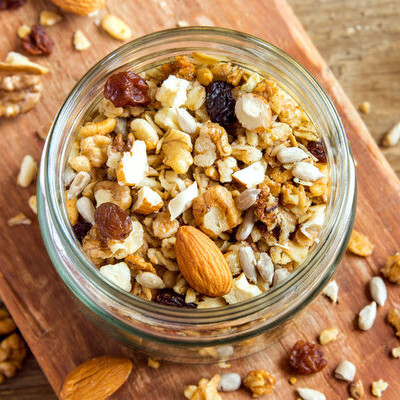Plant-based Protein
What is Plant-based Protein?
Plant-based proteins are isolated or concentrated proteins obtained from plant sources such as seeds, nuts and grains. They are developed to meet consumers need for healthy, ethical and sustainable diets1
In baking, plant-based proteins are used for their nutritional value and functional benefits in bread, muffins, cookies and others.1 Two classes are available:1
- Concentrates: protein content ranges from 50 -75%.
- Isolates: protein content ranges from 85 – 95%.
Origin
Plant-based proteins have been consumed by various populations for many centuries, in particular grains (wheat, rice, sorghum), seeds (chia , hemp), nuts (almond, walnut) and pulses (lentils, peas, beans).1
Health, ethical and environmental concerns have renewed the interest of western societies in plant-based protein alternatives as substitutes of meat-based proteins.1
Function
Plant-based proteins have several functions in baked goods:1
- Water binding: due to the proteins’s water absorption.
- Gelation: upon heating, proteins form gels.
- Emulsifiers: some proteins provide good emulsification.
- Foaming: some varieties (e.g flaxseed or pea) may act as egg whites substitutes
- Lipid and flavor binding: vary depending on physicochemical properties of these proteins.
- Bread improver: some varieties (e.g pea protein) may enhance dough yield.
- Smoother mouthfeel.
- Aroma and flavor: vary among plant sources.
- Nutritional value: increases protein content of baked products.
Nutrition
Due to their high protein content, plant-based concentrates and isolates play a significant role in the human diet and are often associated with several health benefits such as:1
- Increased satiety and weight management
- Decreased blood pressure
- Reduction of cholesterol and triglycerides
- Suppression of hyperglycemia and reducing the risk of diabetes.
- High antioxidant activity
Commercial production of plant-based protein
Plant-based protein isolate and concentrate can be usually obtained through the following processes:1
Wet Method
- Liquid extraction: water, alkali (pH>9.5) or saline solution are typically used with each having a different impact on protein quality.
- Membrane filtration: protein isolate is separated using membranes.
- Drying: filtered protein is dried with roller driers.
- Milling: additional particle size reduction using roller mills.
- Grading: different sized particles pass through sieves, and the appropriate sizes are selected and packed.
Dry Method
- Milling: dried legumes, seeds or nuts are milled to a fine powder.
- Grading: different sized particles pass through sieves, and the appropriate sizes are selected and packed.
- Defatting: further processing may include defatting or lipid removal using supercritical carbon dioxide or solvent removal.
Application
Plant based proteins can be used in bread, muffins, cookies and crackers.
Impact of type of plant protein and usage level on baked goods:1,2
| Plant-based Protein | Baked Goods | Usage Level | Effects |
|---|---|---|---|
| Soy | Bread, Cake | 5 – 20% |
|
| Rice | Bread |
|
|
| Pea | Bread |
|
|
| Oat | Breads | 5% isolate
15-35% concentrate by flour weight |
|
| Flaxseed | Breads, Muffins | Column 3 Value 5 |
|
| Lupin | Cakes, Batters | 20% substitution as egg replacement |
|
| Lentils | Bread | 3% flour weight |
|
| Chickpea | Bread | 3% flour weight |
|
Regulations
Soy, pea, lentil, rice, sorghum, hemp among other plant-based protein isolates are generally recognized as safe by the FDA.3
One issue with soy proteins is the need for label warning about their allergenicity.
In the EU, plant-based protein concentrates and isolates are considered safe by the EU Commission.4
References
- Nadathur, S, Wanasundara,J and Scanlin, L. Sustainable protein sources. Academic Press, 2016.
- Majzoobi, Mahsa, et al. “Influence of soy protein isolate on the quality of batter and sponge cake.” Journal of Food Processing and Preservation 38.3 (2014): 1164-1170.
- Food and Drug Administration (FDA). US Department of Health and Human Services. CFR Code of Federal Regulations Title 21, Part 184 Direct Food Substances Affirmed As Generally Recognized As Safe, https://www.accessdata.fda.gov/SCRIPTs/cdrh/cfdocs/cfCFR/CFRSearch.cfm?fr=184.1553 , Accessed 07 November 2020
- European Commission (EC). Regulation (Eu) 2015/2283 Of The European Parliament And Of The Council Of 25 November 2015 On Novel Foods, Amending Regulation (Eu) No 1169/2011 Of The European Parliament And Of The Council And Repealing Regulation (Ec) No 258/97 Of The European Parliament And Of The Council And Commission Regulation (Ec) No 1852/2001. Official Journal of European Communities, 25 November 2015.


